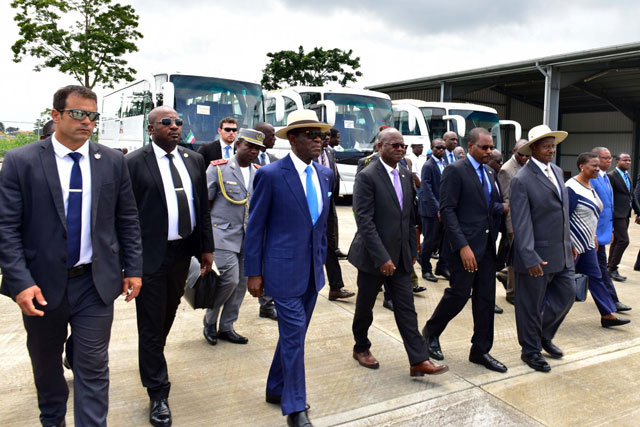
Malabo, Equatorial Guinea | AFP | Equatorial Guinea is ruled by Africa’s longest-serving president, Teodoro Obiang Nguema, who took power by overthrowing his uncle and has since weathered several coup attempts himself.
After claims of a new attempt late December, here is some background about the small nation tainted by claims of corruption and rights abuses.
– Same leader for decades –
Obiang, 75, has ruled the West African country of 1.2 million people for 39 years.
He took power in a bloody coup in August 1979 by ousting his own uncle, first post-independence president Francisco Macias Nguema, who was shot by firing squad.
Obiang has been regularly re-elected but often by default, with opposition parties boycotting the elections.
He won a fifth seven-year term in 2016 with nearly 94 percent of votes.
Obiang’s regime regularly comes under fire from rights groups for violent suppression of the opposition, civil society groups and the media.
– Several coup attempts –
The country has seen a string of attempts to overthrow or assassinate the president.
Authorities say there were four between 1983 and 1988 with several of those behind one in 1986 from Obiang’s own family.
A foiled coup was announced in March 2002, when about 60 people were jailed, and there were rumours of another in October 2003.
The most high-profile attempt was in March 2004 when British mercenary Simon Mann and 60 men were arrested in Zimbabwe, where they were accused of stopping off to fetch weapons ahead of joining a team in Malabo, led by South African Nick du Toit.
Du Toit and Mann were sentenced to 34 years in prison but were pardoned in 2009. Former British prime minister Margaret Thatcher’s son, Mark, pleaded guilty to financing the planned coup.
Also in 2004 a group of Equatorial Guinea “rebels” had tried to invade the island of Corisco and strike a military garrison, the regime said.
And in February 2009 the palace was attacked from the sea with the president the target, authorities said.
– Dependent on oil wealth –
Equatorial Guinea is one of Africa’s most recent oil exporters, beginning exploitation of its oil and gas deposits in the early 1990s when several mainly US oil companies moved in.
Petroleum production dominates the economy. Oil income, however, has dropped heavily since 2014, amid a global fall in prices.
Gross national income per person dropped from $12,850 in 2014 to $7,180 in 2016, according to the World Bank.
A large section of its population live below the poverty line and power cuts are frequent.
Human Rights Watch says the government spent only around three percent of its budget on health and education in 2008 and 2011, for when data is available, while devoting a large chunk to major infrastructure.
– Among Africa’s smallest countries –
The former Spanish colony consists of several islands off the coast of western Africa plus a mainland territory south of Cameroon.
At 28,051 square kilometres (10,831 square miles), it is around the same size as Belgium and one of Africa’s smallest countries.
The political capital, Malabo, is located on the biggest island, Bioko. Bata, the main city on the mainland, is the economic capital.
– Corruption, wealthy elite –
The country is often accused of corruption, with the profits of oil production largely shared among the ruling family, according to multiple human rights reports.
In October 2017 a French court handed down a three-year suspended jail term and fine to Obiang’s son, Teodorin, who is also vice president, after convicting him of siphoning off public money to fund a jet-set lifestyle in Paris.
 The Independent Uganda: You get the Truth we Pay the Price
The Independent Uganda: You get the Truth we Pay the Price



